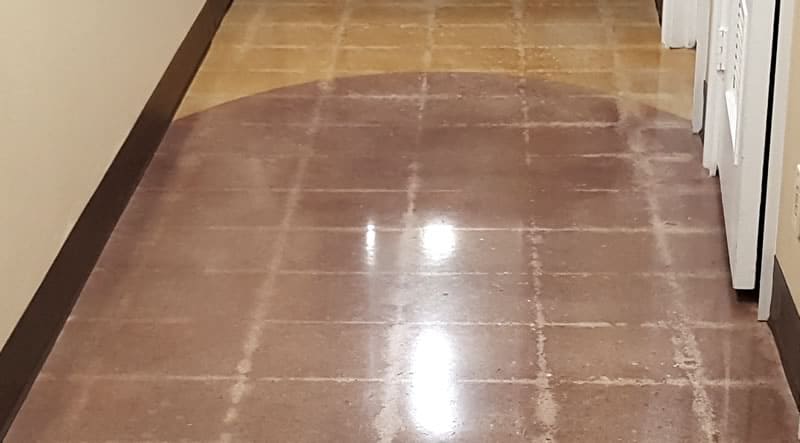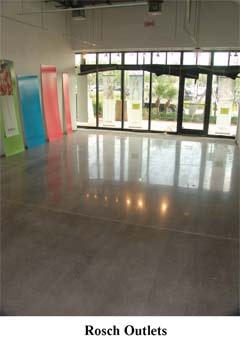Frequently Asked Questions
How is Polished Concrete done?
A: Diamond discs are mounted to an 900lb. grinder. These rough grits remove imperfections of the floor. The concrete is scratched up over and over using the diamond blades (like using coarse sandpaper on a piece of wood). Concrete stock is taken from the top to expose the harder and better concrete underneath. This is done over and over in successive grits and this process refines the concrete. Each scratch pattern is being replaced by finer and finer scratch patterns, until all scratches disappear. Then finer grits are used to create a marble like shine. The process is usually an 8-12 step process beginning with 30 grit diamonds and ending with 3000 grit diamonds.
How long will it last?
Q: What maintenance is required for polished concrete?
Q: Does polished concrete have any harmful VOCs?(Volatile organic compounds)
Q: Where are people using polished concrete?
Q: What about stains on polished concrete?
Q: Do forklift tires mess up polished concrete?
Q: What about 75-year-old concrete that is pitted, well worn, or has had coatings applied?
Q. What makes a concrete slab a poor polishing candidate?
A: If the slab is a soft slab (hardness test under 6) the more likely there will be issues. The softer the slab the harder it is to get a good shine on the floor and honestly the easier the floor will deteriorate once its polished. As a general rule the harder the concrete the better it is for polishing.
Also, If the slab had tile and grout or VCT on it. Ghosting will appear once it ispolished. You will see the lines on the polished concrete from the previous flooring. This cannot be ground off because the effects are through the entire slab. This can be unslightly on the finished product. See picture.
Q: Can the shine be destroyed on a polished concrete floor?
Q: During construction when should we plan the concrete polishing?
Q: Is it good in schools?
Q: Where do you not recommend it in a school?
Q: If a re-polish is needed in 5 or 10 years, what is the cost?
Q: Is it dusty or messy?
Q: What’s the #1 reason people polish concrete?
Commercial & Retail…for its trendy upscale look, cost and brighter facility
Institutional…for its reduced maintenance and durability.
Green Construction…because it is eco-friendly.
Q: Do you apply a sealer?
Q: Are all concrete polishers the same?
As an emerging industry, concrete polishing is experiencing dramatic changes while advancements in equipment and techniques are constantly being introduced. Faster, easier, cheaper methods of polishing are showing up
almost monthly bringing with it budget priced diamonds and densifiers that prove to be unsatisfactory in performance. At the same time, contractors offer their services when in fact, they do not have the knowledgeor proper experience in methods and materials. Many will not grout the floor or will have very limited success in doing so. Some will skip steps, use light weight equipment or try and pass off the mechanical polish with a chemical guard polish.
Do you do samples or mockups?
Do you offer a Warranty?
What is the typical cost for polished concrete?
The cost is very dependent upon the conditions of the floor, whether or not there is an existing coating down and how much remedial work is necessary as well as the number of corners and edges that will have to be hand polished. With that said, most of the projects end up between $3.75 and $6.25. The price can exceed this amount of the conditions and if the client is desiring complex designs and colors.
Cost should also be measured over time. Below is a chart of various flooring
All costs per square foot
| Installed | Annual Maint. | Average Life in Years | Cost to Replace | Total Expense 20 years |
Cost PSF / Year | |
| Cost* | 20 years | Year | ||||
| Vinyl Sheet | 2.72 | 1.39 | 9 | 3.43 | 38.14 | 1.91 |
| Vinyl Tile | 1.23 | 1.47 | 15 | 1.6 | 32.76 | 1.64 |
| Ceramic Mosaic Tile | 6.48 | 1.22 | 20 | 30.88 | 1.54 | |
| Quarry Tile | 5.78 | 0.58 | 20 | 30.18 | 1.51 | |
| Cement Terrazzo | 8.5 | 0.46 | 20 | 20.1 | 1.01 | |
| Granit-Glaze | 6.5 | 0.46 | 20 | 15.7 | 0.79 | |
| Polished Concrete | 3.98 | 0.17 | 20 | 5.9 | 0.3 |
*Comparative costs based on 10,000 square feet. Your costs may vary based on square footage, preparation needs, coloring, etc.
What’s the Next Step?
How Do I Get Started?
812-491-8453
Pick up the phone and call us
Book Appointment
info@concretepolishingevansville.com
Locations
4928 Temple Ave. Evansville, IN 47715
About Us
Deb and I started polishing natural stone over ten years ago with our other business Surface With A Smile. While serving our residential clients we soon noticed people interested in using their existing concrete slabs for staining, coatings or polishing.

